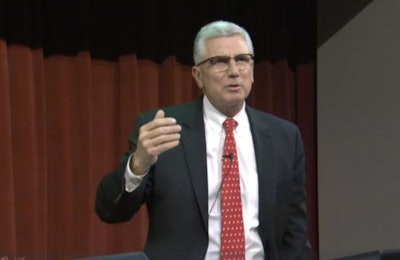
Today’s consumers are cynical and gullible, so people in the agriculture industry need to make sure the messages being heard are accurate, said Donnie Smith, former CEO of Tyson Foods.
Smith, who retired from his leadership role with the largest poultry company in the United States at the end of 2016, spoke about the need to counter the inaccurate anti-agriculture messages that are prevalent on social media while delivering a Heuermann Lecture at the University of Nebraska-Lincoln on January 9.
Same scenario, different message and medium
Smith told of how in 1938, people frequently tuned into their radios, the most common and immediate medium of the day. One infamous broadcast occurred when Orson Welles’ “War of the Worlds” was read over the air. People literally feared for their safety and even their lives when they heard of a Martian invasion.
While it may seem hard to believe that people believed such an outlandish thing back then, Smith said, a similar thing is happening today. However, taking the place of radio is social media, and taking the place of creating fear of Martian attacks is creating fear on how food is produced.
Critics are sending inaccurate messages, saying modern production agriculture technologies and techniques are bad, such as genetically modified organisms (GMOs). They also share messages about how farm animals are mistreated. Smith acknowledged there are a few people who are not doing what is best for the animals or the planet, but for the most part, farmers want to take care of their land, their animals and the people they help feed.
“We’re not perfect, and consumers are cynical and gullible,” said Smith. “I think what we need to do tonight and just stop and listen. Hear that story about how bad modern agriculture is today, and how much we should be concerned about the food that we eat. That’s the message that’s being broadcast today, and frankly, more so than the message that Welles broadcast 80 years ago now. If people believed that story, it’s going to cause a lot more damage.”
With a growing global population and the need to grow food for more people with the same amount of land and water, rejection of modern agricultural technologies would make feeding the world more difficult.
Smith said he knows production agriculture is a time-consuming profession, so those in the industry understandably don’t spend a lot of time communicating their side of the story. However, they need to, he added.
“If we are not telling the real story, the only story on the air is Welles’ story, and it’s not true. That’s a huge problem. It’s also a huge opportunity,” he said.
Communication and the land grant university system
Smith says the agriculture industry needs to build trust in its food and food system. That is no easy task.
“How do you do that with a cynical, gullible consumer who is getting all these inputs that have partial truths, sometimes no truths, that are telling them that the system is not only faulty, it’s unsafe and a lot of times it’s corrupt and you shouldn’t trust it,” Smith asked.
One way to build trust starts at land grant universities such as the one where Smith was speaking.
“The answer to this part of the problem is the land-grant mission,” he said. “We’ve got great researchers that figure out what to do. Then we have great extension groups that can show producers around the world how to do it. Then we make that sustainable by teaching the next generation about what to do and how to do it.”
But, Smith said, a key task is being left out.
“We’re got to start prioritize teaching how to communicate what we’re doing, and how we’re doing it, and why that is so important,” he said. “If folks understood how passionate we are to conserve the resources that God’s given us to be able to do what we do, because if we deplete them, we’re out of business.
“If the chickens, the hogs, the cattle and the turkeys don’t show up, we have a huge problem. So it’s incredible incumbent upon us to be stewards of the resources that we have available to us to provide, great, safe affordable food to the world.”
Student involvement is important
Smith was asked by one high school FFA student in attendance about how to handle the problem. Smith said he for several years has encouraged the National FFA Organization to utilize its students to advocate for agriculture.
For the cynical consumer, the words of a former CEO of a Fortune 500 company that is viewed as “Big Ag” and “Big Food” won’t necessarily be received with confidence, as skeptics believe he has an agenda.
“Look, I’m basically Darth Vader. Nobody’s ever going to listen to me,” Smith said.
But he told the student, if her parents will let her, she should create an account on Facebook, Twitter or Instagram, and let the general public know what life is like on the farm.
“You need to be active on Facebook talking about what’s going on on the farm and why people should believe in their food,” Smith said. “I think you guys are the answer.”
















